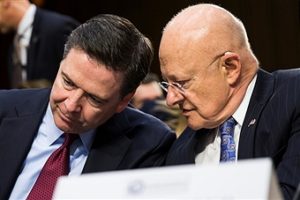by WorldTribune Staff, September 14, 2016
The director of U.S. intelligence decided against conducting an assessment of the damage done to national security by Hillary Clinton’s sending and receiving of classified information on her private email server.
Director of National Intelligence (DNI) James Clapper agreed with intelligence officials “who argued against the need to carry out the damage assessment,” according to a report by Bill Gertz.

A June 2014 counterintelligence directive requires the damage assessment. The directive, ICD-732, states that “damage assessments shall be conducted when there is an actual or suspected unauthorized disclosure or compromise of classified national intelligence that may cause damage to U.S. national security.”
The most sensitive classified information that passed through Clinton’s private server, and possibly obtained by foreign intelligence services, included information on U.S. drone strikes, according to American intelligence officials.
The information on drone strikes is classified above the Top-Secret level and limited to distribution to a few officials in what is called a Special Access Program — an intelligence compartment used to prevent the disclosure of the government’s most secret information.
“Intelligence officials argued in internal discussions that since many details of the drone missile program targeting terrorists were disclosed in earlier leaks unrelated to Clinton’s use of a personal email server, gauging the damage done by her conduct would be difficult, and possibly unnecessary,” the Washington Free Beacon report said.
Angelo Codevilla, a former intelligence officer and former Senate Intelligence Committee staff member, said FBI Director James Comey’s “vague and evasive” comments regarding Clinton’s handling of classified information confirm that she compromised a significant number of secrets.
“Common sense, the intelligence community’s standard practice, as well as a 2014 directive, require assessing the damage done by any such compromise,” Codevilla said. “The DNI’s refusal to conduct such an assessment, even more than the FBI director’s obfuscation, shows that U.S. intelligence agencies have been reduced to mere political arms of the Democratic Party.”
Rep. Mike Pompeo, Kansas Republican and member of the House Permanent Select Committee on Intelligence, wants the DNI to do a formal damage assessment.
“FBI Director Comey has made clear that there was highly classified and sensitive information on Secretary Clinton’s personal server,” Pompeo said. “It is imperative that an investigation be conducted to determine what harm to American national security may have occurred and, just as importantly, to prevent the massive mishandling of sensitive materials from ever happening again.”
Pompeo said the refusal to do the damage assessment, despite the FBI’s determination that a serious leak of national security data took place, “is inappropriate and a grave failure.”
Michelle Van Cleave, former national counterintelligence executive, a senior counterspy policymaker, also called for the assessment.
“Whenever there is a significant compromise of national security information, as the FBI’s report confirms happened here, it is essential to conduct an assessment of the damage in order to protect plans, programs, or lives that may be at risk,” she said.
“The FBI has done a first cut at identifying classified information that was transmitted to or from the secretary of state in the ‘open’ — which means even any second-rate intelligence service could scoop it up,” she added. “So you have to assume the Russians, the Chinese, the Iranians, and a host of others, have their hands on it all.”
Kenneth E. deGraffenreid, a former deputy national counterintelligence executive, said intelligence bureaucrats have opposed damage assessments for years.
“Intelligence agencies hate conducting damage assessments that could show people that somebody did something wrong, or improper, or did it poorly,” deGraffenreid said. “They never want that known. It’s a bureaucracy that does one thing: protects itself.”
DeGraffenreid said Congress should take action to force the intelligence community to launch the damage inquiry.
“These assessments can’t simply be done by the people in the agencies involved,” deGraffenreid said. “That would be like allowing inmates to do an assessment of their crimes.”
